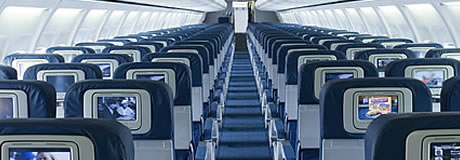Inflight technology

Taking a flight no longer means having to waste time reading that trashy novel you picked up at the airport. Technology has developed so handheld communication can be conveniently used as you fly, with an increasing number of airlines adapting to cater for mobile phones. Although the move has led to some controversy, ultimately the ability to receive and send text messages while in the air could mean prove crucial for that delicate deal.
The basic rules
It was recently revealed that bmi is set to install technology which will allow the passengers to text while in flight - the first UK-based airline to do so. The development of this service to aid passenger convenience comes after new European Commission rules announced in April. Under this legislation, mobile phones can be used on planes once they have reached an altitude of 3,000 metres. However, the use of mobile technology on flights is still decided by the airline so check before you set off.
Telecoms watchdog Ofcom issued an explanation of how the technology works: "Mobile phones will connect to a base station installed onboard the aircraft. This will be connected directly (by wire) to the aircraftís satellite system and signals will be relayed to a satellite dish on the ground. From here the signal will be routed into the telephone network then to the phone of the person you are connecting to."
In early August 2008, the Wall Street Journal reported that Delta Airlines were providing wireless internet access on its domestic fleet - further evidence that passengers are finding it increasingly difficult to be away from their emails and online work for any period of time. Developments such as these will set a precedent which could be copied by other companies very soon.
Qantas allows the use of mobile phones which have been switched to ëin-flightí mode. It is currently looking into the development of new technology which will allow texting from mobile phones and the use of laptops fitted with GPRS capability while in-flight. During the next few years, airlines are expected to watch the public reaction to mobile phone use on planes and announce their decisions in the near future.
Check it out as you check it in
The mobile phone is becoming so welcome on airlines that they can now be used to speed up checking in. In February this year, Virgin Atlantic commented on its development which allows passengers to use a boarding card sent to their mobile. The airline can read the card from the handset: another step in reducing the time wasted at airports and ensuring that each flight is efficient and can be as productive or relaxing as you chose.
Press officer at Virgin Atlantic Janine Donovan explained: "Although it is probably too early to say just how popular it will be, the fact that most people have a mobile phone and it is with them most of the time indicates it would be a powerful way to check them in - by sending them a boarding card that could be read direct from the phone - as well as offering them up-to-date departure information such as gate numbers."
Start as you mean to go on
Airports have also developed to cater for the worker on the move. You donít have to waste a second while waiting for your flight, particularly those who select business class for their travel needs. Heathrow Airport is a prime example, with business lounges and meeting rooms available for hire which offer internet access, fax and phone phone access. All passengers can book into a lounge in advance, where a fee of around £20 gets you a peaceful setting, with complementary beverages and snacks, to relax before taking to the skies.
On-board options
Although the rules vary on each airline, methods of communication and entertainment are of increasingly high standards as they prove a big selling point for quality airlines.
American Airlines Business Class options include a satellite phone, which can be used alongside an individual laptop power point. Work and keeping in touch is also made easier by the provision of Bose Noise Cancelling headphones on its transatlantic flights. The practicalities of the aircraft are complemented by extra legroom and a six way leather headrest, full lumbar support and a headrest for all business class passengers.
Or relax...
However, the availability of mobile phones, laptops and other work-reminders doesnít mean the business traveller shouldnít take the opportunity to relax. With a range of in-flight entertainment, airlines such as Virgin Atlantic offer the latest blockbuster films and video games on your own screen. When flying Premium Economy, the modern facilities are made even more enjoyable with greater legroom and reclining seats.
So, work or play, staying in touch or staying on top - mobile technology can now be an intrinsic part of your flight. Check with your airline on their current policy and prepare to fly into the future.